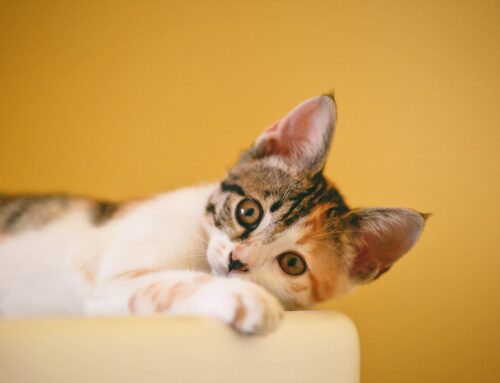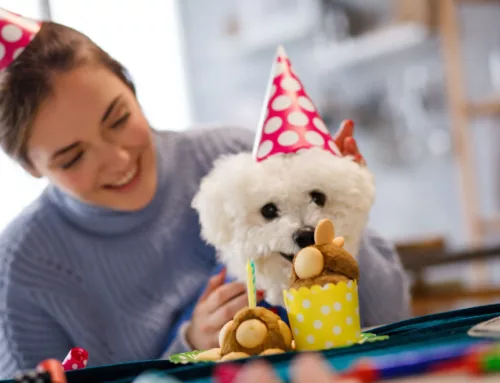 By the time your cat reaches the age of 10, she’s officially a feline senior citizen. The good news is that many cats today are living into their late teens and even early 20s. With the proper care, a kitty in good health at 10 can easily live another 8, 10, or even 12 years.
By the time your cat reaches the age of 10, she’s officially a feline senior citizen. The good news is that many cats today are living into their late teens and even early 20s. With the proper care, a kitty in good health at 10 can easily live another 8, 10, or even 12 years.
So there’s no need to panic if your feline companion is getting older, but it is time to start taking some steps to insure your pet stays as happy and healthy as possible throughout her senior and geriatric years.
Here we will look at how cats show signs of aging and what you can expect as your kitty gets older.
What to Expect at 10 to 12 Years
By the time most kitties turn 10, they have slowed down a little (or a lot, depending on how high-energy they were as youngsters). You might notice your cat isn’t jumping up on high surfaces as much anymore, or isn’t climbing to the uppermost spot on the cat tree.
And while all cats, regardless of age, do best with a consistent daily routine, older cats can become especially stressed when presented with anything new or different in their environment.
You might also notice your kitty doesn’t always run right out to greet you when you get home. He may not initiate play as often as he once did, and he may take more naps.
Many cats also become more vocal as they age, and more fearful of strange or loud noises and unfamiliar people.
Older cats can also suffer from many of the same health challenges older humans face, including arthritis, diabetes, thyroid problems, and kidney disease, so it’s really important to bring your cat for twice-yearly wellness visits with your vet. The sooner a change in your kitty’s health is identified and addressed, the easier it will be to resolve or manage the problem.
At veterinary visits, be sure to mention any and all behaviour changes you’ve noticed in your cat, no matter how minor, as these can provide important clues about health problems that may be brewing under the surface. It’s also important you and your vet keep regular tabs on your cat’s weight, to assure she isn’t gaining or shrinking over time.
What to Expect at 13 to 15 Years
From 13 to 15 years of age, not only are most cats moving quite a bit slower than they once did, many are also experiencing at least some loss of vision and hearing.. They may also have less tolerance for cold temperatures.
Elderly cats can develop age related dementia, making small changes in their environment or routine increasingly stressful. Some older kitties are also easily confused.
Along with more napping and less activity, your senior cat may grow a bit cranky and easily irritated. If your household includes young children or a rambunctious dog, everyone will need to learn to approach kitty in a quiet, non-aggressive manner. And if yours is a multi-pet household, it’s important not to allow your aging cat to be bullied by younger pets who may sense a change in the natural pecking order.
You may also notice that your cat prefers to spend more time alone these days. You can enhance his feelings of safety and security by making his favourite hideout a warm, comfy little spot he can retreat to whenever he likes. But keep in mind that senior cats still need to interact with their humans regularly, so set aside some time each day to spend with your pet. You can engage him in gentle play, an ear scratching session, or some brushing or combing.
What to Expect at 16 Years and Older
If you’re lucky enough to share your life with a cat of 16 or more, first of all, congratulations! Either you’ve done a bang-up job raising your kitty to a ripe old age, or you’ve opened your heart to an elderly cat in need of a loving home in her final years. Regardless, you did good!
As a point of reference, you can reasonably compare your cat at 16 to an 80-year-old human. She’s moving and thinking more slowly these days, and she may have an assortment of age-related health challenges. She’s probably not as alert or responsive as she once was, and at times she may seem quite confused.
Even if she’s still in good health, chances are she’s sleeping and vocalizing more, and interacting with family members less. She may not be as perfectly groomed as she was in her younger years, and even the most well-mannered geriatric cat may occasionally forget to use her litter box.
As long as your cat is seeing the vet at least twice a year for check ups, and between visits you’re keeping an eye out for significant or sudden behaviour or health changes, there’s no reason to be alarmed. Try not to hover, as your cat is still a cat and prefers attention on her own terms. Do make every effort to keep her comfortable, secure and relaxed by maintaining a consistent daily routine and providing her with a quiet, cosy hideaway equipped with comfy bedding and a familiar toy or two.
At your regular vet visits, you’ll want to mention any changes you’ve noticed in your pet, including increased or decreased appetite or water consumption, constipation or incontinence, aggressive behaviour, or mental confusion. You’ll also want to keep an eye out for signs that your cat is in pain, which can include hiding, teeth grinding, panting, shortness of breath, loss of interest in food, or reluctance to move around.
Five tips to ensuring your OAP cat grows old gracefully 
1. A Good Diet :
Many cats tend to put on weight as they get older and their metabolism slows down. If it reaches the point of obesity, not only is the cat’s quality of life is significantly diminuished but they may be at greater risk of diabetes. Cut back on fatty treats and ask your vet to recommend a calorie controlled diet that will help your cat lose weight without missing out on nutrition.
2. Proper Exercise :
Cats lose mobility as they age, often for the same reasons that people do: arthritis, weight gain, inactivity… Leaving them to lie around won’t help – quite the opposite, in fact, Cats need physical activity throughout their lives, even if it’s more moderate as they get older. To help maintain his muscle tone, agility and circulation, play with your senior cat regularly in ways that will encourage gentle movement.
3. Frequent Vet Visits:
Your cat’s immune system will decline with age and his skin will become thinner, making him more vulnerable to infection. Older cats are also prone to a host of chronic medical conditions, including dental disease, diabetes, Kidney failure, hyperthyroidism, high blood pressure, arthritis and cancer.Expect to spend more time at the vet’s as your cat gets older: check-ups should be more frequent than before, and more thorough. As well as a physical exam, your vet may want to test your cat’s blood, urine and stool at least once a year to check that her kidneys, liver and pancreas are all working as they should.
4. Watching for Behaviour Changes.
Elderly cats are also susceptible to senility or feline cognitive dysfunction. The condition can result in a number of undesirable behaviours, including peeing outside the litter box, meowing excessively, avoiding interaction, failing to recognise familiar surroundings and wandering aimlessly. There’s no cure for cognitive dysfunction, so follow your vet’s recommendations for managing the condition and be as patient as you can: it really isn’t your cat’s fault.
5. Creature Comforts:
Older cats will appreciate a helping hand. Think about ways you can make your cats life more comfortable, by relocating food bowls to a spot that he can get to without climbing or jumping, for instance, choosing a litter tray with lower sides that’s easier to enter, or providing a warm, comfy bed. Senior cats often find it difficult to groom themselves, especially if they have joint problems. You can help by brushing your cat daily from head to tail, and trimming his claws if he can no longer keep them short by using his scratching post.

Ode To an Old Cat
I have shared with you your laughter,
You have wet my fur with tears.
We’ve come to know each other
Throughout these many years.
Just one more hug this morning
Before you drive away,
And know I’ll think about you
Throughout your busy day.
The time we’ve left together
Is a treasured time at that.
My heart is yours forever.
I Promise – This old cat.
Author: K Bigamon




